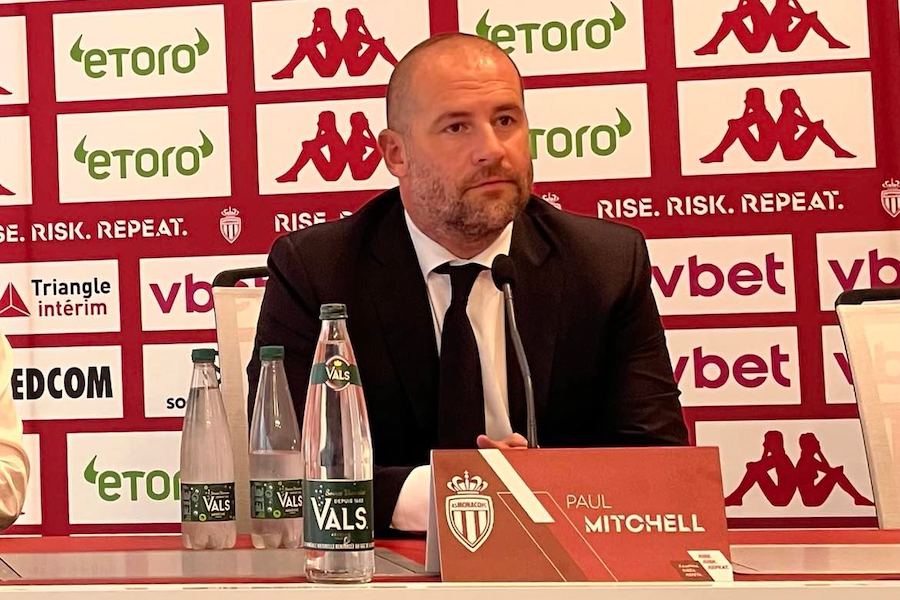AS Monaco once again found themselves the victim of harsh refereeing treatment during Saturday’s defeat to Lens in what was a record-breaking gameweek for red cards in Ligue 1.
For consecutive weeks, Monaco has seen red. After Youssouf Fofana’s harsh sending off in the 15th minute of last week’s match against Rennes, Vanderson was then shown a red card late-on against Lens. That time there were fewer arguments, with the Brazilian right-back picking up, arguably, two merited yellows.
The drama this week centred around a “soft” penalty call in favour of the visiting Lens side. Despite very limited contact from Breel Embolo, Florian Sotoca tumbled in the box to earn his side a spot-kick at a critical moment in the game. Seko Fofana scored the resulting penalty, restoring Lens’ two-goal advantage and killing Philippe Clement’s side’s momentum.
Whilst Monaco can once again feel aggrieved with their treatment, the issue of refereeing transcends the Principality side. The Lens penalty, which Clement described as “very, very soft” was one of many contentious decisions across the French league this weekend.
In fact, it was a record-breaking weekend for Ligue 1. The 11 cards dished out throughout the gameweek is the most seen since Opta records began 30 years ago. 10 red cards have previously been given out on two occasions, firstly during gameweek five of the 1999/2000 season and then during gameweek 35 of the 2020/21 season.
This record-breaking weekend is a symptom of much harsher decisions being taken by referees. Following his side’s 2-1 win against Montpellier, which saw both sides receive two red cards, AJ Auxerre manager Jean-Marc Furlan bemoaned the frivolity with which referees are currently brandishing red cards.
“It’s quite over the top in a match where there wasn’t any extreme violence. It shocked me a lot, relative to what I experienced as a player. I was a serial killer and I never got a red. UEFA and FIFA have changed the rules and rightly so, but in our era, when we played, we killed each other. Normally there were three fights a match and there was never a yellow or a red,” said Furlan. “Instances have changed that because there were severe injuries. But in this match, where I had the feeling that everything was fair between the two sides, you get the impression that you just have to play volleyball or basketball. It’s very penalising.”
Furlan wasn’t the only manager to take aim at referees this weekend. OGC Nice manager Lucien Favre was also critical of the lowering of the bar regarding what constitutes a foul in the box.
“What I don’t like are the penalties that we’re giving for nothing. When I see some matches where the ball touches the finger, involuntarily, and then the referee blows. That, between us, annoys me. I don’t get annoyed often, but I can’t stand that. We’ll soon have to cut off our arms,” said the Swiss coach.
Even prior to this weekend, the standard of refereeing had been a staple topic in discussions about France’s top division. Last season, Lyon president Jean-Michel Aulas and Marseille president Pablo Longoria both called for referees to be mic’d up, as they are in rugby.
Questioned by Monaco Life on whether he would be in favour of a move to mic referees up during matches, AS Monaco sporting director Paul Mitchell said, “It’s quite an effective way to understand the decision-making process from the officials in rugby. I think it has worked very effectively. I would like more communication between the referees’ association and the clubs. Maybe there is some added value that we could create there from a footballing perspective. Having a deeper understanding of what they go through, the process, the context, the analysis and how they come to those decisions, I think that’s about communication.”
The Englishman continued, “I wouldn’t mind having the referees mic’d-up just to have an understanding of the process before they make that critical decision, because it is critical. After 20 minutes in the game, that’s (Fofana red card) a big call, especially when it’s a game between two really good teams. Once again, an ambition of mine coming to France was to try to drive the product of the game. That’s always an ambition wherever I work. I want to see the product at its maximum and I think it can only be at its maximum when you’re playing fairly 11-v-11. So for me, it’s a pioneering idea, but once again, the biggest thing is understanding the decision making process before you make that critical decision and how can we enhance that and make it better, where we’re making more consistently good decisions than not.”
Whilst consistency of decision-making, which has been lacking in recent weeks, is key, so is ascertaining the threshold of what constitutes serious foul play. Currently that bar is seemingly set very low, and whilst Monaco have been a victim of that low bar in recent times, they are not unique in that sense. With the low drone of dissenting voices multiplying following a weekend of questionable refereeing calls, the debate around how to improve such an integral element of the game will likely intensify in the coming days and weeks.
Photo of Paul Mitchell by Monaco Life
